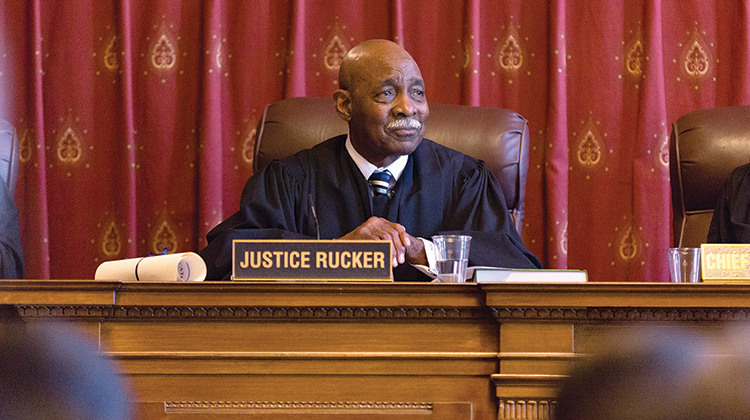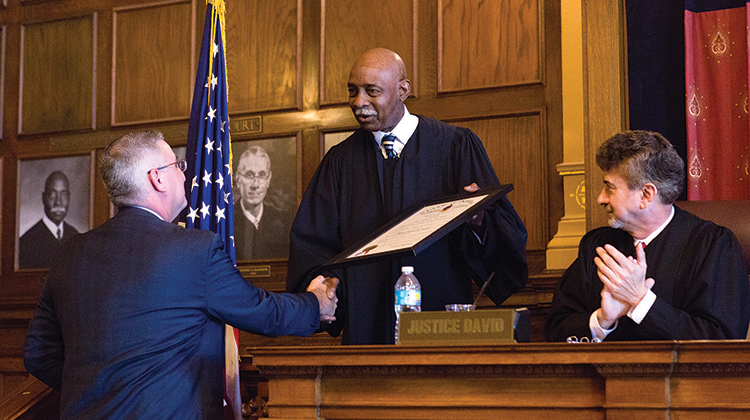
Justice Robert D. Rucker retires after 17 years on the Indiana Supreme Court
Robert D. Rucker was born in Canton, Georgia and grew up in Gary, Indiana. The man he most admired was his father, Robert Dennis Rucker, Sr., who worked hard and taught him the value of an education. He wanted his son to have the opportunity to work somewhere other than the Gary steel mills.
As the oldest son with three younger brothers in what would later become a combined family that included three more boys and five girls, Rucker grew up in an environment that had many challenges. He easily could have walked down other paths, and many that would have taken him very far from serving on the highest court in Indiana.
In fact, he did work in the steel mills and decided that it was not the life for him. Although his counselor at Gary Roosevelt High School discouraged him from even applying to college, he knew that education was his ticket out. Rucker also gained strength from one of his favorite quotes:
“It’s your attitude, not your aptitude, that determines your altitude.”
He enrolled at IU Northwest while working to pay for his college expenses. One semester he substituted a class that reduced his caseload by one credit hour, making him eligible for the draft. Rucker served in the Vietnam War as a member of the Army 1st Cavalry Division (Air Mobile), and fought to relieve Marines who were under siege at Khe Sanh. He was awarded the Bronze Star and a Purple Heart while serving his country.
Upon his return home, Rucker re-enrolled in college with the goal of becoming a doctor. He signed up for, and excelled at, the required science courses-chemistry and physics. Then one day he met a young Gary lawyer named Alton L. Gill, a Howard Law School graduate. He was learned, articulate, poised, confident, and impressive in many other ways. That encounter changed the life path, and the future, for young Robert Rucker.
The decades of the 60’s and 70’s were turbulent in many ways. Social activists, fiery orators, and thought-provoking writers challenged many truths that were once self-evident, but no longer. One of those writers was Frantz Fanon, and reading his books was a rite of passage. Rucker read his best-known: The Wretched Of The Earth; Black Skin, White Masks; and, A Dying Colonialism. Those books informed him on a number of issues of the day and had a lasting impression. In fact, he has a son named after the writer: the Honorable Fanon Adeyemi Rucker, Judge, Hamilton County Municipal Court in Cincinnati, Ohio.
Rucker graduated from Indiana University (B.A. 1974) and Valparaiso University School of Law (J.D. 1976). In 1998, he earned a Master of Laws degree in the judicial process from the University of Virginia Law School.
Following law school, he served as a Deputy Prosecuting Attorney for Lake County, as Gary City Attorney, and engaged in the general practice of law in East Chicago. He also served on the board of directors of the Indiana Trial Lawyers Association as well as the Northwest Indiana Legal Services Organization.
In 1991, Governor Evan Bayh appointed him to the Court of Appeals of Indiana. While on the Court of Appeals, he served as vice-chair of the Indiana Commission for Continuing Legal Education.
In 1999, Governor Frank O’Bannon named Rucker as the 105th justice to the Indiana Supreme Court. He was the second African-American to serve on the state’s highest court. The first was Myra Selby who was appointed by Governor Evan Bayh. Before retiring, he was the only justice on the court appointed by a Democratic governor.

Justice Rucker is a member of the American Bar Association, the Indiana Judges Association, the Indiana State Bar Association, the Marion County Bar Association, and the James C. Kimbrough Bar Association, and is a Fellow of the Indianapolis Bar Foundation. Justice Rucker also served as the 2009-2010 Chair of the Judicial Council of the National Bar Association.
During her annual State of the Judiciary address in January 2017, Chief Justice Loretta Rush stated: “His contributions to Indiana’s jurisprudence are remarkable. His legal scholarship is innovative and insightful in applying the constitutional values he has sworn to uphold.” She added; “Rucker’s opinions have enforced core constitutional values — such as preserving family integrity and community and ensuring access to justice for people with limited English proficiency.”
Rush highlighted his opinion in Anglemyer v. State that has been cited many times throughout the country. His research and analysis of U.S. and Indiana Supreme Court opinions, U.S. and Indiana constitutional provisions, Indiana statutes and statutory history, and his thoughtful writing brought clarity to Indiana’s sentencing laws. This opinion held that when a trial court imposes sentence for a felony offense it must issue a sentencing statement that includes a reasonably detailed recitation of the trial court’s reasons for the sentence imposed.
Justice Rucker received an extended standing ovation by everyone in the audience in the chambers of the Indiana House of Representatives during the 2017 State of the Judiciary, including the Governor, Lieutenant Governor, Senators, Representatives, his fellow Supreme Court Justices, Appellate Court and Trial Court Judges, court staff, friends, and family.
On March 7th, the Indiana Senate unanimously passed Senate Resolution 38, co-authored by President Pro Tem David Long and Minority Leader Timothy Lanane, honoring and thanking Justice Rucker for exemplifying “the utmost integrity during his nearly three decade tenure on the Indiana Court of Appeals and Supreme Court” and “for his immeasurable contributions to the Indiana Judiciary and legal community.”
The judicial building in Gary, Indiana is named the Justice Robert D. Rucker Superior Courthouse; and, in 2015, Valparaiso Law School named a lecture series after him.
To honor Rucker’s years of service, on March 9th the Supreme Court returned to his alma mater, now called Theodore Roosevelt College & Career Academy, to hear oral arguments in the case of Danny Sims v. Andrew Pappas and Melissa Pappas. About 300 high school students from nine high schools had an opportunity to hear the case and participate in a question and answer period.
As reported in the local media: “time and again, the crowd of high school students, local attorneys and judges, and politicians gave Rucker a standing ovation and repeatedly clapped and laughed as he responded to questions and comments.”
On March 26th, Valparaiso Law School sponsored the Justice Robert D. Rucker Inaugural Lecture at Wesemann Hall. His topic was: “Behind The Scenes – An In-Depth Journey Through the Inner Workings of the Indiana Supreme Court.”
While Justice Rucker is noted and praised for his writing in the Anglemyer v. State opinion noted above, the Marion County redistricting case Peterson v. Borst, 786 N.E.2d 668 (Ind. 2003) also brings him pride.
In that case, Marion County judges aligned along party lines to support Republican City-County Council President Philip Borst’s redistricting plan over one offered by Democratic Indianapolis Mayor Bart Peterson. The matter came before the Indiana Supreme Court, which at the time was comprised of three justices appointed by a Democratic governor and two justices appointed by a Republican governor.
Many expected the court to likewise split on partisan lines and endorse Peterson’s plan. Justice Rucker noted that the opinion was a collective effort of the Court, which discussed the independence of the judiciary refusing to be drawn into partisan redistricting wars. The Court drew their own maps that were specifically based on population, not politics. Justice Rucker added: “It was a very proud time, and that’s the one opinion that sort of grabs me to this day.”
Justice Rucker brought a perspective to the Court that will be difficult to replace. As an African American, he understood the unique challenges faced in our society by the minority community.
As someone who faced economic hard times, he knew what it was like to suffer because of limited resources. As a citizen of Gary, he appreciated the daily grind of people living in a tough economic and social environment.
Although his voice will not be heard asking questions at oral arguments, or in conference with the Justices discussing cases and other matters of court, perhaps from time to time one of his colleagues will ask: What would Justice Rucker say?
In addition to his son, Judge Fanon Rucker, Justice Rucker and his wife, Dr. Denise Rucker, are also the proud parents of James Rucker (Marietta, Georgia), Dawn Rucker Frye (Harrisburg, Pennsylvania), Stephen Shaun Jones (Memphis, Tennessee), and Allison Trotter, (Phoenix, Arizona) along with seventeen grandchildren and five great-grandchildren.
Known for their dashing moves on the dance floor, Justice Rucker believes that their future will likely be filled once more with ballroom dancing, and time on the golf course. Both Rucker and his wife are avid golfers. They also enjoy gardening and travel, especially to the Caribbean where Barbados is their favorite spot. He enjoys fishing and plans to continue serving the judiciary as a Senior Judge on the Court of Appeals.
If Justice Rucker was not a judge he imagines that he would probably be a college professor teaching courses on current social issues or political science. His favorite books are non-fiction, and he recently finished “We Were Soldiers Once…and Young: la Drang–the Battle that Changed the War in Vietnam” by Lt. General Harold G. Moore (Ret.) and Joseph L. Galloway.
He is currently reading “And, We Must Make Them Noble: A Contextual History of the Valparaiso University Law School, 1879-2004” by Michael Iren Swygert.
While he does not have a favorite meal or restaurant, he loves anything prepared by his wife, Denise, who is an excellent cook with a wide range of specialties.
We wish Justice Robert Rucker much success and happiness in his days after the Court, and we want him to know that he will be missed for a myriad of reasons.